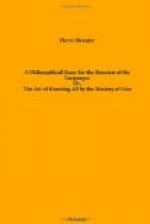I can hardly believe I shall meet with any inclinable to quarrell me for the number of 24. that I have thought on for my designe, since I presume it no easie matter for the most nicely curious to find a just occasion; and although there are none of them that are not unquestionably deriv’d from the same originall, it being no great difficulty to convince any well settled head, that in the propriety of speech there is but one mother Language: Yet to avoid confusion I distribute them all into 7. different orders, as they seem to carry an immediate reference to the Languages, which are the commonly suppos’d originals: such are in the opinion of the Learned the Roman, and the Greec, the Teutonic and Sclavonic, the Hebrew, Scythian, and the Persian.
The Roman Idioms are the Italian, Spanish and French, which cannot now be unknowne to any but such as are shamefully ignorant; I may adde likewise the Portuguese, which although not very different from the Castilian, yet is not wanting in its owne particular beauties, and hath receiv’d no mean accession of use and honour from the conquests of its Kings in the most remote parts of the world.
To the Greec I shall reduce its 3. principall relations, viz the Literall Greec, such as we meet with in our old Classic Authors, the vulgar as it is commonly used since the declining age of the Empire at Constantinople, and the Coptique or AEgyptian, which is but a remainder of the famous government of the Ptolomies in AEgypt: for although in its idiome there be something yet remaining of an originall stamp, either in that its words seem to touch upon the auntient Language of the Pharaohs, or that its inflection no way resembles the Greec, yet the Empire of Alexander and his successors induc’d such a confusion, that the Greec hath almost got the better, and involv’d all the lesser remains of Antiquity.
Under the Teutonic I comprehend the Almain or high German, the Flemmish or low Dutch, the English and the Danish, which is to this day entertain/’d in the most Northerne regions, and may give us some intimations of a clearer light then any besides, as having yet carefully secured some footsteps of the ancient Language.
The Sclavonic is accompani’d with 3. more considerable dialects the true Sclavonic, the Polish, and Muscovitish, to which the valour of the Nations that speak them have brought more reputation then any other ingenious performances.
The Hebrew hath no less then seven in its retinue, the pure Hebrew, such as we meet with in our Bible, the Language of the Rabbins and Talmudists, the Chaldee, the Syriaque, the AEthiopick or Abyssin, the Samaritan, and the Arabique, which in our age hath so inlarg’d its dominion, that its either spoke or understood in the three parts of the Old World Asia, Africa and Europe; and hath alone produc’t such a prodigious number of books, that one would scarce believe how a Nation so famous for its exploits in warr should have so much leasure to attend to the improvement of learning.




